When the 大象传媒 first asked me to consider writing an adaptation of 's classic novel , my initial reaction was uncertainty. I've adapted a few classics over the years and I wasn't sure this one was right for me - it's been done many, many times and felt over-familiar in some ways. But as I began thinking about it, it did seem to me that the grown-up adventure genre had been neglected on TV in recent years, and that this might be an opportunity to do something in that vein that felt modern and exciting. I'm glad to say that the 大象传媒 responded to my suggestion that we should not adapt the novel, but base an entirely new series on the famous characters of , and adapt the themes and spirit of the novel rather than the letter.
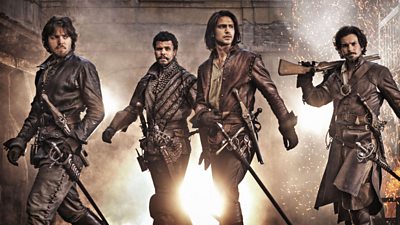
The brief, from 大象传媒 In-House Drama, , and , the producers, was to make a long-running series that had returnable potential, would play to audiences around the world, and would have a "story of the week" format, and limited serial storylines. I was happy to work within that format, though over the development period the serial element became stronger as I am convinced audiences need these kinds of story hooks to keep coming back every week. But generally we were working within a very clear and prescribed framework, which was a given of the commission. It was also made clear that the show should be able to play pre-watershed if necessary (although in the end it didn't) and that therefore there should be no nudity and no extreme violence. In other words, it could be adult in theme but it couldn't be , even if I'd wanted it to be.
I've always loved what might loosely be called the "swashbuckling" genre and clearly Dumas's great novel fits squarely into that template, and perhaps even created it. But swashbuckling means different things to different people, and when we began talking about developing the series, it quickly became clear that we all wanted an adult show that would have serious themes and issues at its heart, and which would have strong dramatic storylines that meant something to a modern audience. "Action" is not an easy genre to define. Too often it means a kind of empty virtuoso display of pyrotechnics that ultimately fails to move either the heart or engage the brain. And although everyone agreed that would need plenty of action, we also felt very strongly that action in itself, endless displays of sword-fighting and so on, no matter how well done, simply wouldn't be enough.
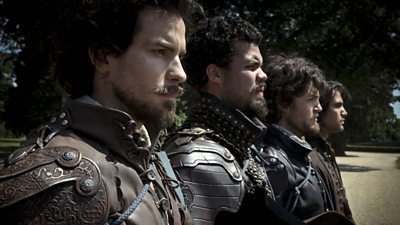
So I approached it as I would any other drama, working with the characters first to develop interesting and complex storylines that had real dramatic consequences. At the same time I wanted to use an idiomatic and relaxed modern language that would feel accessible to our audience without jarring them out of their belief in the show's premise and setting. I wanted to avoid language that was too obviously 21st century - no contemporary slang, no swearing - but create dialogue that was relaxed and convincing in the historical setting we were creating. "Period" language is always a problem in period dramas, for my money - it usually resembles a kind of stilted version of received pronunciation which is ultimately no more convincing than something much less formal. The truth is that we're not in 17th Century France and trying to write dialogue as though we were is, to my mind, pointless. And given that I wanted the show to feel modern and accessible to audiences who might have little interest in costume dramas, I felt the dialogue had to sound contemporary and at the same time convincing for the world I was creating.
As much as anything, in making The Musketeers, I was trying to adapt the idea of Dumas as much as the reality. In talking to people I found that comparatively few people had ever read the book, but most people had some idea of what it contained. I was trying to catch that expectation in as fresh and exciting a way as I possibly could. Some things in the drama, it's true, are pretty close to the novel, and some things aren't. That's a pattern that will continue as the series develops. For example the / storyline is closely derived from the novel, although it veers in different directions. But most of the "stories of the week" are entirely original. And most of all I wanted to honour the spirit of the novel and the spirit of all the adventure films I loved growing up - from , to , to , right up to reinventions of the genre like .
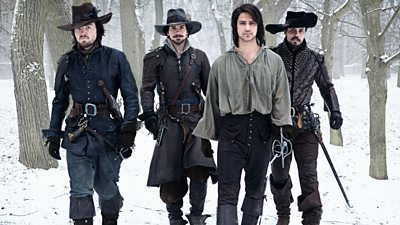
It did seem to me that a sense of humour was built into people's perception of the characters and that's very much something I wanted to reproduce in a contemporary context. But while I want the show to be funny, I never want that to be at the expense of the reality of the action and the drama. Slapstick is a real danger in this genre, and I think it's something to be avoided, because if wrenches the viewer out of the reality of the story and into something else. After all, if we give the impression we're not serious about our stories, why should we expect the viewer to be? So my hope is that the humour is easy and natural, and stems always from character and from the natural banter of men who face danger and even death on a routine basis.
Action, romance, humour, thrills, extreme peril - these seem to me to be the essential building blocks of this genre, and I wanted to couple them with a depth of reality and conviction in the stories that made our audience feel the stakes were high and the outcomes really mattered. This is a world where when someone draws their sword, someone is going to die and die for real. I wanted the action to hit hard, and to matter.
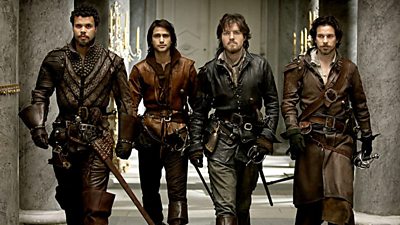
As Executive Producer and lead writer of the show, I had a very high level of creative control. This isn't quite the American model, which is hard to reproduce in a British context, but it is pretty close to it. Aside from writing four of the scripts and supervising the rest of the storylines and other episodes, including, at times some over-writing to ensure the tone and feel of the show was completely uniform, I was heavily involved in the creation of the look of the show, the costumes, the set design, the casting, the choice of directors and so on. This level of involvement is all about better collaboration at al levels, and making sure that everyone is committed to making the same show. I think this kind of role for the creator-writer is essential on any modern drama series, and I hope it happens more and more often in British television - certainly things seem to be heading in that direction and the 大象传媒 were more than supportive of the role I wanted in the show.
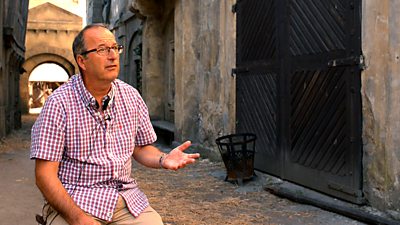
Writing and making The Musketeers was as big a challenge as I've ever faced creatively and of course the audience will decide if it is successful. But it's a joy to see it come to life exactly as I imagined it. Writing any kind of genre show is never easy and especially not one where there is no real common agreement over what, in 2014, a period adventure might be or who its audience is. Obviously we're in the process of finding out now, and so far so good. My intention was to write an exciting adult adventure show that would be accessible to the whole family, and I hope, at the very least we've achieved that.
Adrian Hodges, February 2014
is broadcast on 大象传媒 One on Sunday evenings at 9pm.
Follow on Twitter
